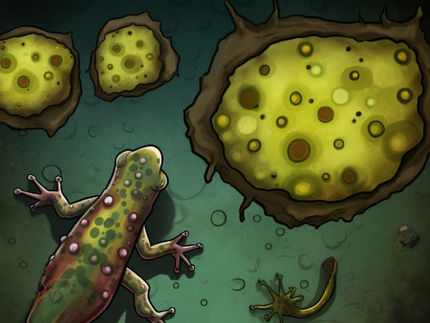Forever young
Research team discovers mechanism for the rejuvenation of unicellular organisms
Advertisement
A team of scientists from the Cluster of Excellence "Balance of the Microverse" has discovered a previously unknown rejuvenation mechanism in unicellular organisms. They studied unicellular microalgae, which serve as the basis of food chains in the oceans. Unicellular organisms, such as microalgae, also age when they can no longer divide due to a lack of nutrients. The newly discovered mechanism enables old cells to rejuvenate and divide again after they have reached nutrient-rich areas of the oceans. The results of this study could have far-reaching consequences for understanding cell ageing and regeneration in marine ecosystems. The corresponding study was recently published in the scientific journal ‘Nature Microbiology’.
Unicellular organisms, such as microalgae, reproduce by cell division. But when the nutrients available to them are exhausted, they stop this process. The cells survive and age, but can no longer divide. In the ocean, currents ensure that these "old" cells can be transported to more nutrient-rich areas, which can enable renewed cell division.
The research team led by Dr Yun Deng, postdoc at the Institute of Inorganic and Analytical Chemistry at the University of Jena and first author of the study, and Prof Dr Georg Pohnert, Professor of Analytical Chemistry, has now discovered that old cells have a rejuvenation mechanism that enables them to divide again. The researchers discovered that these cells secrete bubbles, so-called "vesicles". These transport harmful metabolic products and toxins out of the cells, which creates the conditions for new cell division.
"Our study has shown that this vesicle production is essential to cell rejuvenation. By getting rid of harmful substances, the cells create the conditions for new cell division," explains Prof Pohnert. The researchers also discovered that this rejuvenation process is controlled by bacteria. These bacteria induce vesicle production through chemical signaling and thus contribute to restoring the old cells' ability to divide. "This is a fascinating example of the complex interactions between microorganisms in the ocean," says Dr Deng.
This finding could have far-reaching implications for our understanding of marine ecosystems and the global biogeochemical cycles. In plankton, algae divide at an enormous rate and contribute to global CO2 fixation and oxygen production through their photosynthesis. In fact, algae in the oceans produce almost as much oxygen as all plants on Earth combined. The newly discovered rejuvenation mechanism now provides explanations for the complex, annually repeating patterns of species composition in plankton and thus for the fundamental understanding of the global climate functioning.





















































